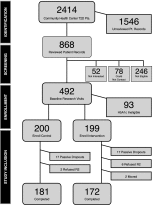An internet-based diabetes management platform improves team care and outcomes in an urban Latino population
- PMID: 25633661
- PMCID: PMC4370332
- DOI: 10.2337/dc14-1412
An internet-based diabetes management platform improves team care and outcomes in an urban Latino population
Abstract
Objective: To compare usual diabetes care (UDC) to a comprehensive diabetes care intervention condition (IC) involving an Internet-based "diabetes dashboard" management tool used by clinicians.
Research design and methods: We used a parallel-group randomized design. Diabetes nurses, diabetes dietitians, and providers used the diabetes dashboard as a clinical decision support system to deliver a five-visit, 6-month intervention to 199 poorly controlled (HbA1c >7.5% [58 mmol/mol]) Latino type 2 diabetic (T2D) patients (mean age 55 years, 60% female) at urban community health centers. We compared this intervention to an established, in-house UDC program (n = 200) for its impact on blood glucose control and psychosocial outcomes.
Results: Recruitment and retention rates were 79.0 and 88.5%, respectively. Compared with UDC, more IC patients reached HbA1c targets of <7% (53 mmol/mol; 15.8 vs. 7.0%, respectively, P < 0.01) and <8% (64 mmol/mol; 45.2 vs. 25.3%, respectively, P < 0.001). In multiple linear regression adjusting for baseline HbA1c, adjusted mean ± SE HbA1c at follow-up was significantly lower in the IC compared with the UDC group (P < 0.001; IC 8.4 ± 0.10%; UDC 9.2 ± 0.10%). The results showed lower diabetes distress at follow-up for IC patients (40.4 ± 2.1) as compared with UDC patients (48.3 ± 2.0) (P < 0.01), and also lower social distress (32.2 ± 1.3 vs. 27.2 ± 1.4, P < 0.01). There was a similar, statistically significant (P < 0.01) improvement for both groups in the proportion of patients moving from depressed status at baseline to nondepressed at follow-up (41.8 vs. 40%; no significance between groups).
Conclusions: The diabetes dashboard intervention significantly improved diabetes-related outcomes among Latinos with poorly controlled T2D compared with a similar diabetes team condition without access to the diabetes dashboard.
Trial registration: ClinicalTrials.gov NCT02156037.
© 2015 by the American Diabetes Association. Readers may use this article as long as the work is properly cited, the use is educational and not for profit, and the work is not altered.
Figures
References
-
- Centers for Disease Control and Prevention (CDC) National Diabetes Statistics Report: Estimates of Diabetes and Its Burden in the United States, 2014. Atlanta, GA, U.S. Department of Health and Human Services, 2014
-
- O'Connor PJ, Sperl-Hillen JAM, Johnson PE, Rush WA, Biltz G. Clinical inertia and outpatient medical errors. In Advances in Patient Safety: From Research to Implementation (Volume 2: Concepts and Methodology). Henriksen K, Battles JB, Marks ES, Lewin DI, Eds. Agency for Healthcare Research and Quality, Rockville, MD, 2005 - PubMed
Publication types
MeSH terms
Substances
Associated data
Grants and funding
LinkOut - more resources
Full Text Sources
Other Literature Sources
Medical


